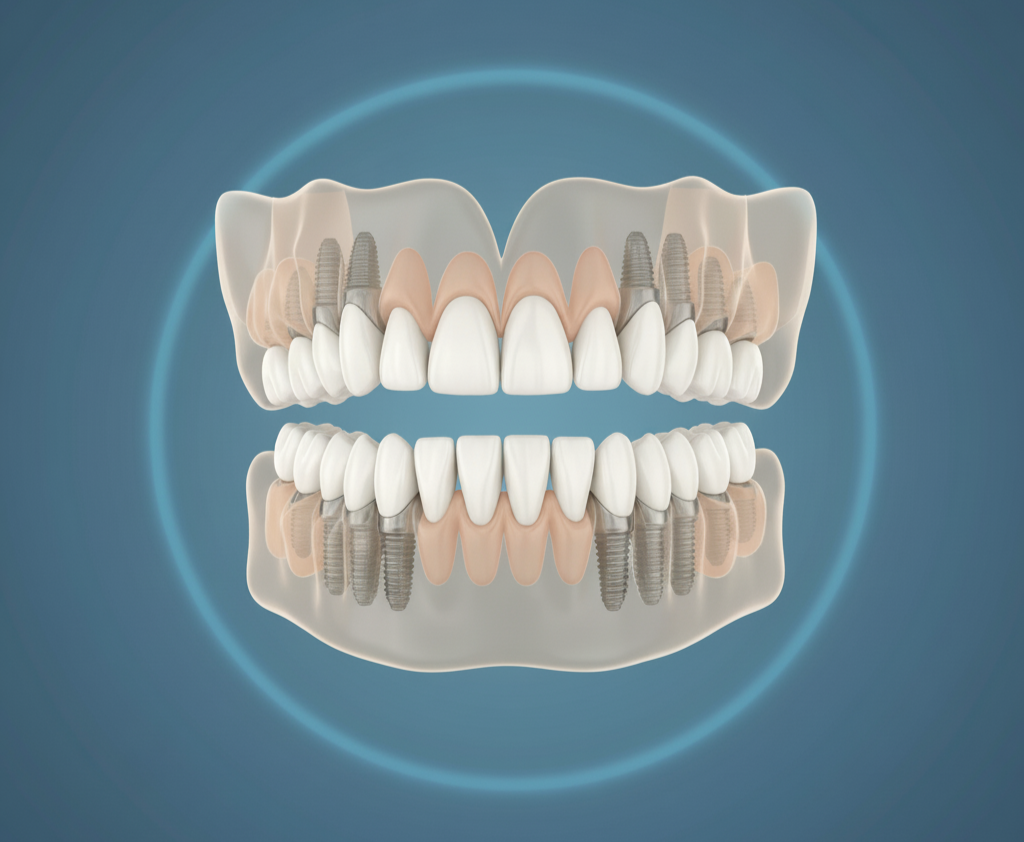Full-Arch Restorations: Rebuilding Function and Confidence After Tooth Loss
When patients come to our office dealing with extensive tooth loss, they often share similar concerns. They've stopped enjoying meals with family. They feel self-conscious during conversations. Many have tried traditional dentures but find them uncomfortable or unreliable.
These concerns are valid, and they affect quality of life in real ways. At State Avenue Dental Office in Kansas City, we've worked with many patients facing these challenges, and full-arch dental restorations have consistently proven to be a transformative solution.
Understanding Full-Arch Restorations
A full-arch restoration replaces all the teeth in an upper or lower jaw using a fixed bridge anchored to dental implants—typically four to six per arch. Unlike removable dentures, these restorations are permanently secured, providing stability that closely mimics natural teeth.
The distinction matters. Removable dentures rest on your gums and can shift during eating or speaking. Implant-supported restorations are fixed in place, eliminating movement and the need for adhesives.
Restoring Chewing Function
One of the most significant concerns patients express is their ability to eat comfortably again. Clinical studies indicate that full-arch implant restorations restore approximately 70-80% of natural chewing force, compared to traditional dentures which typically restore only 20-25%.
In practical terms, this means patients can return to eating foods they've avoided—fresh vegetables, steak, crusty bread, even corn on the cob. Just as importantly, they can eat without constantly thinking about whether their restoration will stay in place.
I've had patients tell me that the simple act of eating lunch with colleagues became stressful with dentures. After receiving their full-arch restoration, that anxiety disappeared entirely.
Beyond Function: The Broader Impact
While improved chewing ability is significant, patients often report other meaningful changes:
Speech clarity improves. When teeth are missing or dentures fit poorly, pronunciation suffers. A stable, properly designed restoration allows for natural, clear speech patterns.
Facial structure is maintained. Tooth loss leads to bone resorption, which can create a sunken facial appearance over time. Because dental implants integrate with the jawbone, they provide ongoing stimulation that helps preserve bone density and facial contours.
Daily confidence returns. Many patients describe a mental burden they didn't fully recognize until it was gone—the constant awareness of their teeth, the hesitation before smiling in photos, the careful monitoring during conversations. With a secure restoration, that burden lifts.
The Importance of Proper Planning
Full-arch restorations require careful evaluation and precise execution. We use 3D imaging and digital treatment planning to assess bone density, determine optimal implant positioning, and design a restoration that distributes forces appropriately while looking natural.
Working as a dentist in Kansas City, Kansas for years, I've learned that successful outcomes depend on attention to individual factors—your specific anatomy, bite pattern, aesthetic goals, and overall health. Each case requires a customized approach.
We also believe in taking time with patients. This is a significant decision, and you should feel informed and comfortable with your treatment plan. Some patients are ready to proceed quickly, while others prefer to consider their options carefully. Both approaches are entirely appropriate.
Maintaining Your Restoration
Patients often ask about the care requirements. The routine is straightforward:
Brush twice daily with a soft-bristled toothbrush
Use a water flosser to clean around the bridge and implants effectively
Attend regular dental appointments for professional cleaning and monitoring
Avoid habits that place excessive stress on the restoration
Most patients find this maintenance routine manageable and actually less complicated than caring for removable dentures.
Is Full-Arch Restoration Right for You?
Full-arch restorations work well for patients missing most or all teeth in an arch who have adequate bone support and are committed to maintaining good oral health. During a consultation, we'll evaluate your specific situation, discuss realistic outcomes, and answer your questions thoroughly—without pressure or sales tactics.
If you're struggling with missing teeth, uncomfortable dentures, or declining oral function, these issues don't improve on their own. Waiting often means additional bone loss that can complicate treatment later.
Contact State Avenue Dental Office today to schedule a consultation. We'll take the time to understand your concerns, evaluate your oral health, and discuss whether full-arch restorations are appropriate for your situation. You deserve to eat comfortably, speak clearly, and feel confident—and we're here to help you achieve that.



